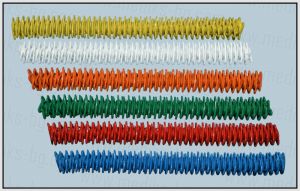Botanical Name: Pinus pinaster
Country of Origin: USA
Although pine oil can cause allergic reactions, it is very useful to relieve mental, physical and sexual fatigue, while having a cleansing and clearing effect on a room. Even though it can be used in cystitis, hepatitis and prostate problems, as well as to improve circulation and to relieve rheumatism, gout, sciatica and arthritis, it should be done so with care due to the sensitizing nature of this oil.
Oil properties: Pine oil has a fresh forest smell, is pale yellow in color and watery in viscosity.
Origin of pine oil: This evergreen tree can grow up to 40 meters (130 feet) and has a flat crown and has a reddish-brown, deeply fissured bark, needle-like gray-green leaves that grow in pairs, orange-yellow flowers and pointed brown cones.
It is extensively cultivated for its wood, tar, pitch, turpentine and essential oil and was used by the Native Americans to prevent scurvy. Mattresses where stuffed with the needles to repel lice and fleas and the ancient Egyptians used pine kernels in their cooking.
Extraction: Our product is extracted by steam distillation of the twigs and buds and yields about 0.1 -.05 %, although another type of oil can also be extracted by steam distilling the needles.
Chemical composition: The main chemical properties of pine oil are borneol, bornyl acetate, a and b-phallandrene, a and b-pinene and 3-carene.
Precautions: Although pine and pine needle oil is considered non-toxic and non-irritant in low dosage it should still be used with care on the skin, since it can cause irritation in high dosage and may sensitize the skin as well. The oil from the dwarf pine (Pinus mugo. var. pumilio) is a dermal irritant and a sensitizing agent. Should you be prone to allergic skin reactions or are pregnant - rather give this oil a miss.
Therapeutic properties: The therapeutic properties of pine oil are antimicrobial, antineuralgic, antirheumatic, antiseptic, antiviral, bactericidal, balsamic, cholagogue, deodorant, diuretic, expectorant, hypertensive, insecticidal, restorative, rubefacient, adrenal cortex stimulant as well as stimulant to the circulation and nervous system.
Uses: Pine oil is most useful to relieve mental, physical and sexual fatigue, while having a cleansing and invigorating effect on an area and is great for vapor therapy in a sick room as it promotes healing.
It can be used for cuts and sores, scabies and lice and for excessive perspiration, while its warming properties help with rheumatism, arthritis, gout, muscular aches and pains and it can stimulate circulation. Furthermore it can help in cases of bronchitis, asthma, catarrh, coughs, laryngitis, colds and flu. It eases breathlessness and sinusitis.
As a general kidney cleanser, it is effective with cystitis, prostate problems and urinary infections and can also help with nervous exhaustion, neuralgia and mental fatigue.
Summary: Pine oil can be useful in the treatment of the respiratory tract, for muscular aches and pains, and as a urinary cleanser.
-
Burners and vaporizer: In vapor therapy it can be used for asthma, colds, coughs, smokers cough, drowsiness, hangover and sinusitis.
-
Blended oil or in the bath: In a blended massage oil or diluted in the bath, it can be used for asthma, cellulite, colds, coughs, hangover, infections, rheumatism and sinusitis.
Care should however be taken if you are prone to allergic reactions, and this oil may also irritate the mucus membranes.
Pine oil blends well with: Although most essential oils blend well with one another pine oil blends particularly well with cedarwood, eucalyptus, lavender, niaouli, rosemary and sage.
Important Note: The information provided is for educational purposes only.






